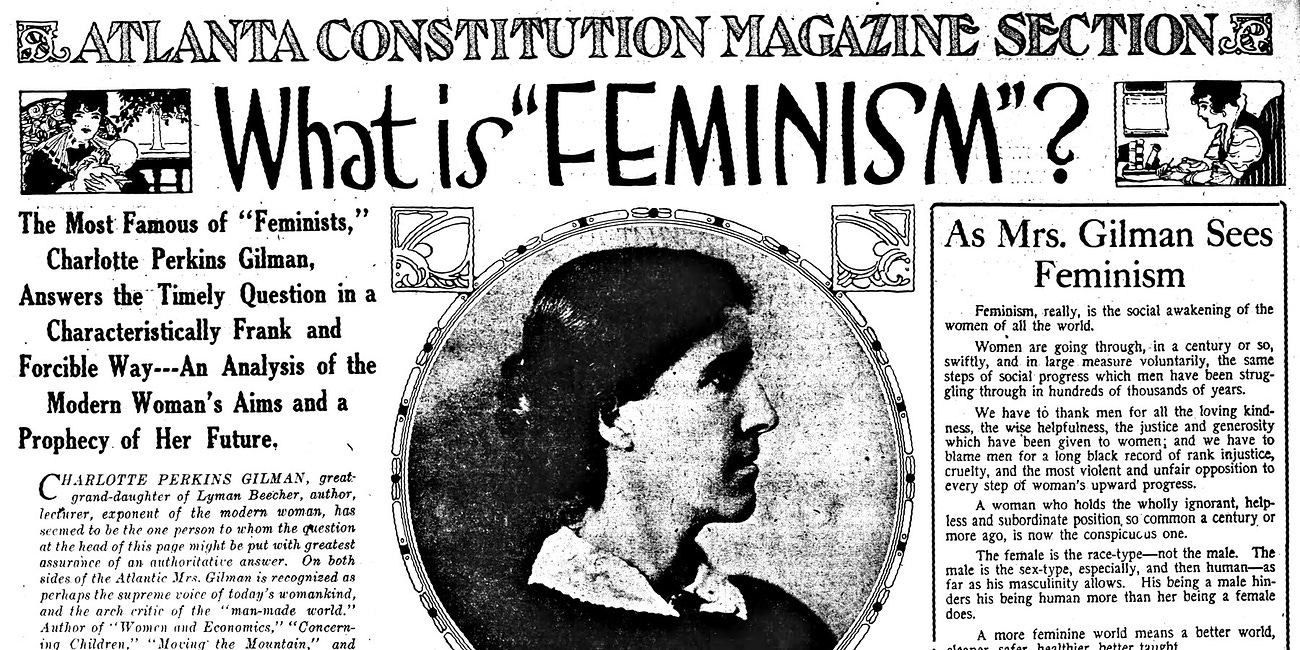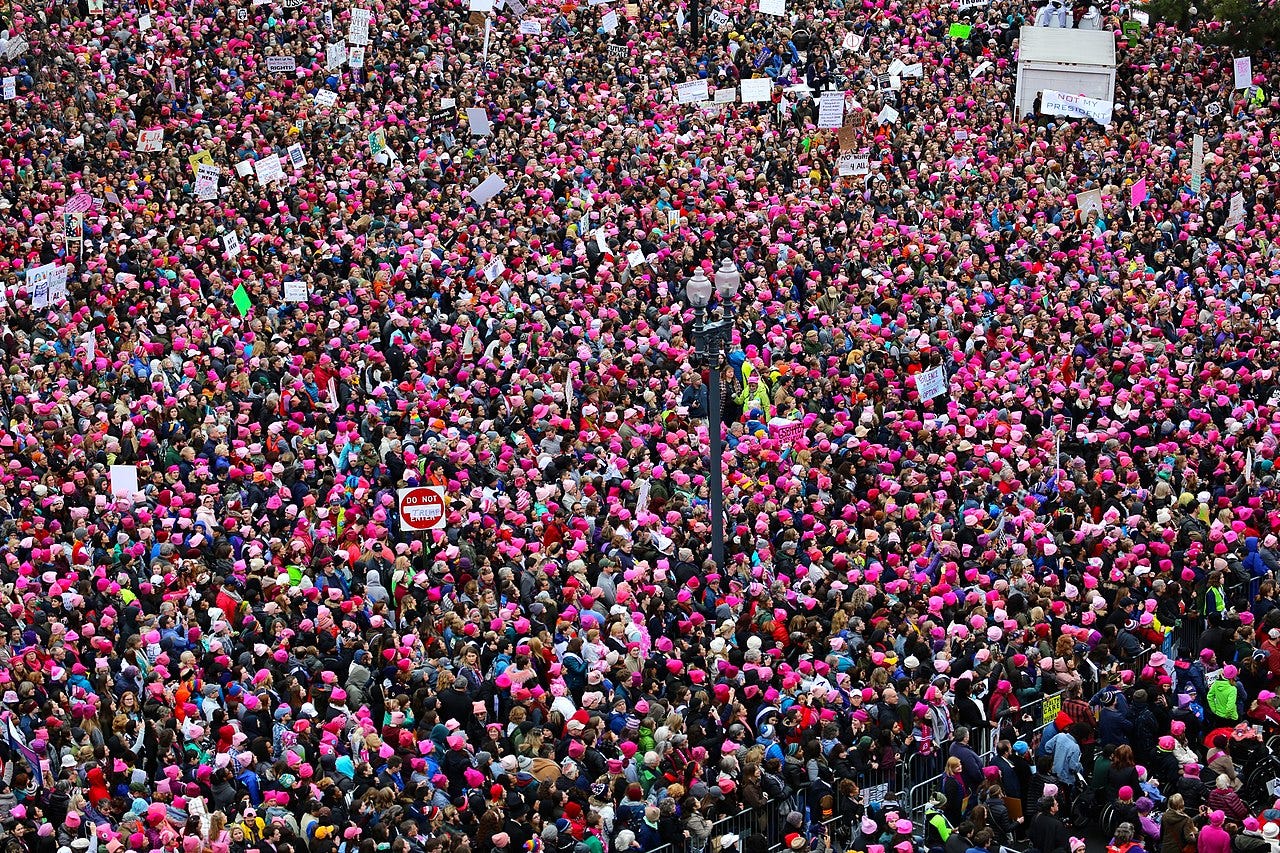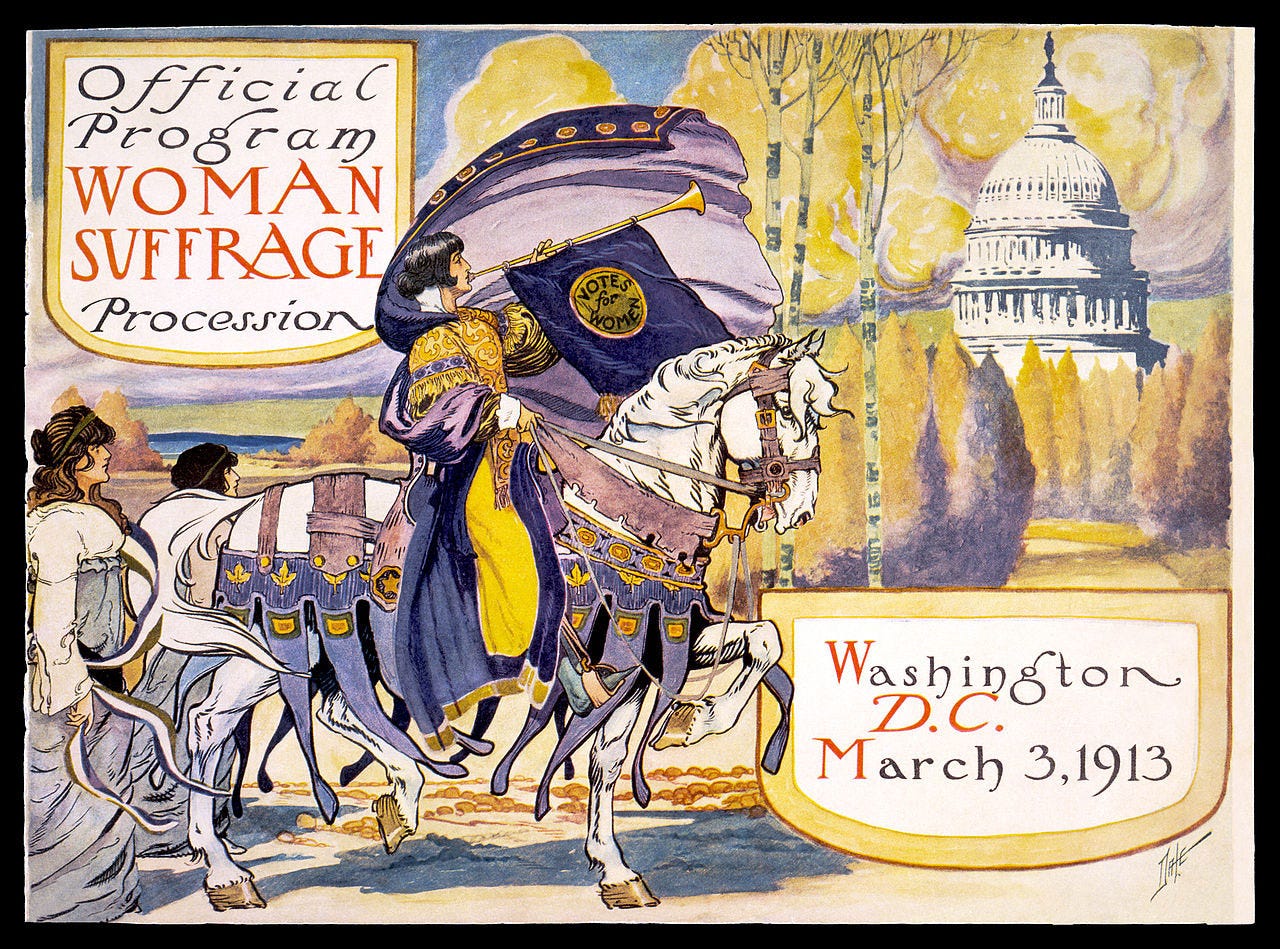“There Are More of Us Than There Are of Them”: How To Be A Feminist in 2023
Part two of our conversation with the Guardian's Moira Donegan about the crisis in American feminism
247 years ago today the United States declared independence, and it only took another 144 years to pass the Nineteenth Amendment, giving women the vote. The road to equality has been treacherous, and we’re all still marching on it, even as the last few years have seen obstacle after obstacle thrown in our path. As I noted last week, American feminism is in a moment of crisis, and as someone who’s identified as a feminist my entire life, I’ve been struggling to understand how we came to this place, and where we go from here. How to take back our bodies, futures, and our equality.
To help me wrap my brain around these questions, I called up Moira Donegan, a leading feminist intellectual whose work I’ve long admired. Moira is an opinion columnist covering gender and politics at The Guardian, and writer-in-residence at Stanford’s Clayman Institute for Gender Research. We wound up going deeper than expected, exploring lessons from feminism’s past and possibilities for its future. You can read part one of our conversation here:
One of the reasons I wanted to talk to you is because I find myself a bit politically homeless. I'll put it this way: if the goal of the nineties was to compromise with the boot, so that it wouldn't break your back, now there's a sense where you can't compromise with the boot. It's got steel toes, it's got spikes coming for you. It will smash you.
It’s so fucking grim and hard not to feel super paralyzed, cowered and scared. There are women’s lives at stake every day in this struggle. And it’s like … what do we do?
Every time women take very real risks and swallow some of the very real consequences for being angry about injustice in public — every time somebody does that, it creates more permission for other women to do it. That’s not bullshit. That’s true. The more you are willing to talk about this, the more courage other people will have to talk about it.
And in terms of the Christian right? Look, there's fucking more of us than there are of them. It’s true that they are winning right now, and that they have a very powerful weapon in the federal judiciary. But they can’t win long term, because nobody wants to fucking live like that and they can’t make us.
There are a lot of small grassroots groups, people doing abortion funds, people getting abortion drugs to those who need them. I think we need a greater variety of local small-scale focused feminist organizing — basically we could really do with a return to in-person consciousness-raising, which was a tactic of the second wave in which women would gather in groups in real life with other members of their community to talk about the way that sexism was impacting them. And they were radicalizing movements.
Look, women are a huge constituency. There’s a whole fucking lot of us, and we have different perspectives and need different things in this struggle against the common oppression of misogyny. But small-scale groups of people who are in community with each other looking at their own needs — and by people I mean women — I think that those can actually be very effective and purposeful. You mentioned being frustrated with this women’s group at your synagogue growing up…
At the time I was 12.
Learning to read from the Torah — That’s actually a great accomplishment that you should get to do proudly in front of your religious community. Right? But that it took an organizing group of women to get you what you could get — I actually wish I had those kinds of women’s affinity groups.
The Sword and the Sandwich is a newsletter about serious extremism and equally serious sandwiches. Please consider supporting this work with a paid subscription:
There’s amazing stuff that’s being done in the Orthodox community, but part of the reason I left my faith was just like, “What the fuck is this? Why should my gender limit my opportunities to lead in the first place?” But you make a choice to stay and fight. And there are some women who were my teachers in high school who have made that choice. I don’t wanna minimize those accomplishments. I think they’re amazing, these women that stay in fight and do these things and change the face of Modern Orthodoxy, against significant pushback.
The thing is, in feminism there are always a lot of liberation movements, a tension between the incrementalist harm-reduction liberals and the tear-it-all-down, this-is-bullshit radicals. And what you actually need is both.
I’m gonna sound like Hillary fucking Clinton here but stay with me, because I think the liberals make institutions and communities survivable. They do a lot of hard work, and it opens up mainstream possibilities and expands the way that little girls can think. And that allows people to see more contradictions and to go, “Fuck you, I’m just actually gonna go be a radical because this is not a sustainable contradiction.” And if you don’t have the radicals, the liberals assimilate and capitulate and wind up disappearing back into the misogynist mainstream.
So you need these people doing both the inside and the outside work — and Act Up was very good at this, because they had college-educated white boys from Wall Street go in and talk to the pharmaceutical company, and extract a very specific concessions. And then they also had the muscle of these big crowds of queers chanting outside the pharmaceutical company’s office. They have this inside and outside track, and that was able to move quite efficiently. The problem in Act Up is that the alliances between liberals and radicals tend to break down because they don't trust each other.
Right now, in feminism, we just don’t have either. We have a lot of people who share these principles, who are looking at the possibilities for their own lives being constrained, who are feeling this rearranging indignity, in many cases every fucking day. And they don’t know where to go.
I’m looking at Planned Parenthood in 2023, and I gotta tell you, the cavalry’s not coming. If you want a feminist future — if you want this kind of organizing — you’re going to have to do it yourself. You know, after Trump got elected, I went to the Women’s March. I was there with my sign, waiting to be told what to do. And a big part of my own political maturation in the years that followed has been realizing that nobody’s going to tell you what the instruction is. Nobody’s gonna prevent you from getting it wrong if you do try. There’s a degree of risk-taking and courage that I think this political moment is requiring from a lot of us.
Let’s talk about Hillary for a second.
She is mom, the mom we have to kill. I’m sorry.
When I told my male friends, “Actually it would be really amazing to have a woman president. That would mean a lot to me.” And I did vote for her, right? And I’m like, “Okay, she did war crimes and that’s bad. And her pragmatic incrementalism inflicted a lot of harm along the way.” But you don’t get to be in those positions of power without making monstrous compromises, and actually, a woman president would be really fucking powerful and meaningful for me. And my male friends were like, “We don’t get it.”
On the day of the 2016 election, I remember people were going to Susan B. Anthony’s grave and putting their “I voted” stickers on it. And then you go back and look at Susan B. Anthony's life.
Yeah. Some of her statements were really bad, man.
The rise of women’s suffrage was intimately intertwined with prohibition — it started because women were like, “Our husbands are drinking and beating us, and we don’t want that to happen and we have no recourse but to gather and pray in saloons,” until their husbands were shamed into not being in the saloons. And that developed into the Women’s Christian Temperance Union. But a big part of the strategy of women’s suffrage was: why should white women have to wait behind black men to vote?
“Black men can do it. Why can’t we?”
And black women were just left out of the room. So I think it is important to note that a lot of feminism was liberation for white women. There’s been a lot of institutional racism in feminist groups. There was a reason why black womanism arose in separate and parallel development because the misogyny was everywhere.
It’s difficult to have the conversation without getting into these really reductive and stupid debates: “Susan B. Anthony was racist and therefore women’s suffrage is bad.” It can get so stupidly reductive.
There’s this ripping in half of the feminist soul — or at least my feminist soul — because you want to look towards the future, towards a more just world where the body that you’re born with does not narrow the possibilities for your life, or the possibilities for your dignity. And you also want to look back to the past, to models, to encouraging stories of victory, to intellectual frameworks so that you don’t have to continually reinvent the wheel. I haven't liked everything that I've found in the feminist past. In fact, I’ve been really disgusted and hurt by some of it, and it is important neither to deify these figures nor to disavow what is useful about that history and that legacy.
I don't think anybody really needs an Urban Outfitters votive candle of Susan B. Anthony to think that women’s citizenship is worth fighting for. I don’t think you need to go back and read transcripts of consciousness-raising groups where it’s eight white women, and seven of them are graduates of Smith. You have to understand these things for what they are: some very flawed people, who in some cases should know better. Susan Anthony came from the abolitionist tradition. She did know better.
I don’t think you need to make them saints to continue down this road that they were pointing towards. And we don't all have to be Susan B. Anthony — I’m picking on Susan B. Anthony, but she’s one. A big thing that anti-abortion people like to say is, “Oh, Margaret Sanger …”
“... was a eugenicist.” Okay. Who gives a fuck?
It’s actually not bullshit — she entertained and raised money from eugenicists. Like, there’s facts there. But she was also a very passionate feminist. The failures of the past did not need to constrain…
… the possibilities of the future. We can reckon with the horrors of the past and still say it was amazing that these women broke glass ceilings. To return to your parent metaphor, it’s not even killing mom; it’s that moment when you break from your parents a little as a teen and you’re like, “Oh, they’re people. And they’ve fucked up in these ways, and I will take some of their values and I will discard others.”
It’s actually not bad that feminism has this tradition of learning from the mistakes of past leaders, and refusing to revere them, or make them into symbols beyond their actual contributions and uses as people. The only way to be a perfect feminist is to not be one.
We’re in this existential fight for our lives, our rights. It’s like these people want us to be enslaved in domestic submission, servanthood. And we outnumber them. There are points of departure, there are ways of fighting if we have the courage to frame it as an existential fight.
A brilliant Catch 22 of patriarchy is that it puts women in the position of being people with an obligation to take care of others, including the people who are oppressing them and killing them and keeping them down. And it is very hard to gain sympathy for women who reject that. And to gain the courage to be a woman who rejects that.
It’s so hard, because nobody likes to be insulted and degraded, and it’s very natural to be like, “I'm scared of being hurt.” Not just emotionally, but even physically. Because we live in a very violent country. So it does involve finding the courage to be called a bitch, the courage to be called a harridan. The terms change, but the sentiment doesn’t: if you want more than you’re given, you will be called everything under the sun. And that hurts and it’s scary and it sets you apart and it might lose you friends. These are painful things. But this is a moment in which many women are in pain to the point of death, and that needs to be met with equal urgency.
There’s a genuine battle internally that a feminist has to undergo in order to accumulate the courage to be disliked, in order to advocate for women’s rights and dignity in public. The courage to be wrong, the courage to be disliked, the courage to get it wrong — these are all very real risks. I don't want to downplay them. But they become a lot more palatable when we're not doing it on our own, when we have communities of people who treat us with respect in this shared endeavor. I always try and balance engaging with audiences that don’t always agree with me on feminism, and then revisiting smaller not-public groups of women who respect me and share my values, who might still tell me that I’m fucking up, but who I don’t have to fear are gonna destroy me through that disagreement.
I think social media is super useful for connecting people, but it’s also this perennial public forum where actively hostile actors will hijack and try to destroy any incipient connection.
We want to dismantle these structures of oppression that have been built up over half a century. And we’re having to do it with national institutions that once were leaders, but have been hollowed out and made irrelevant. It’s a monumental task. And it’s one that, given the gravity of the moment we’re in, must be undertaken. They did it before. They fucking got prohibition. They got the vote.
At the very beginning of the conversation, you said the reason it took fifty years is because not everything worked. So we have to just try, and fuck up, and try, and fuck up, and try and fuck up, and when people call us every name, we lose our fear. It gets burned away from us.
The more times I’m called a cunt, the less it hurts.
Yeah, I’m pretty battle hardened by now. I will tell you this: being the persona non grata of Nazis for a long time will really burn away a lot of your fear of criticism. But if you’re not used to that kind of baptism of fire, it really is very fucking scary.
But I say we start it at our tables, and then we move it to the streets. We figure out who’s gonna work from the inside, and who’s gonna work from the outside. It is fucking time to act out, drop the brooms, you know, sharpen their handles and get out on the street.
I love it.









Great article!!